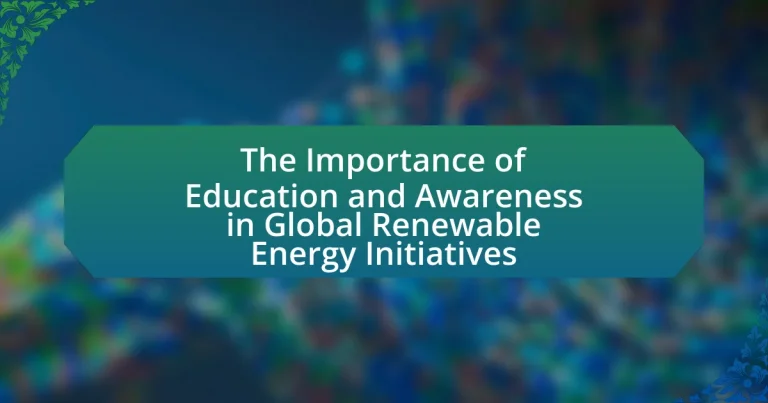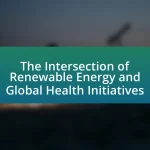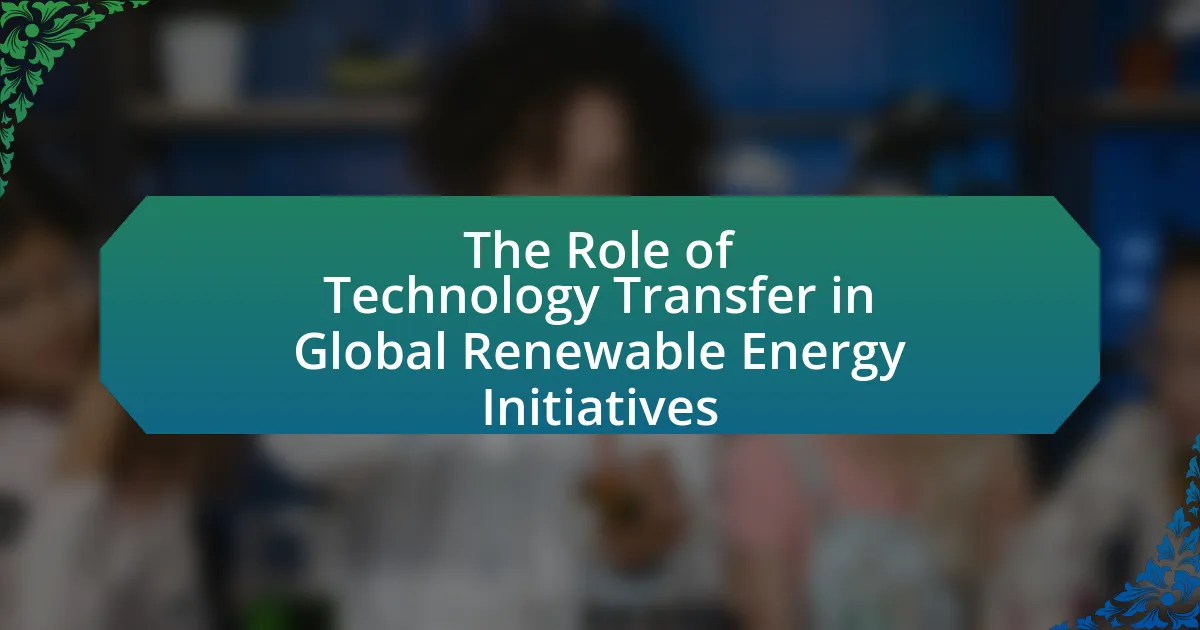The article focuses on the critical role of education and awareness in advancing global renewable energy initiatives. It emphasizes how education empowers individuals and communities to understand and adopt sustainable energy sources, such as solar and wind energy, leading to increased public support and innovation in the sector. Key components discussed include the influence of education on public perception, its impact on policy-making, and the effectiveness of awareness campaigns in promoting renewable energy technologies. The article also addresses challenges in promoting education and awareness, such as misinformation and funding limitations, while highlighting best practices and collaborative efforts that can enhance understanding and engagement in renewable energy solutions.
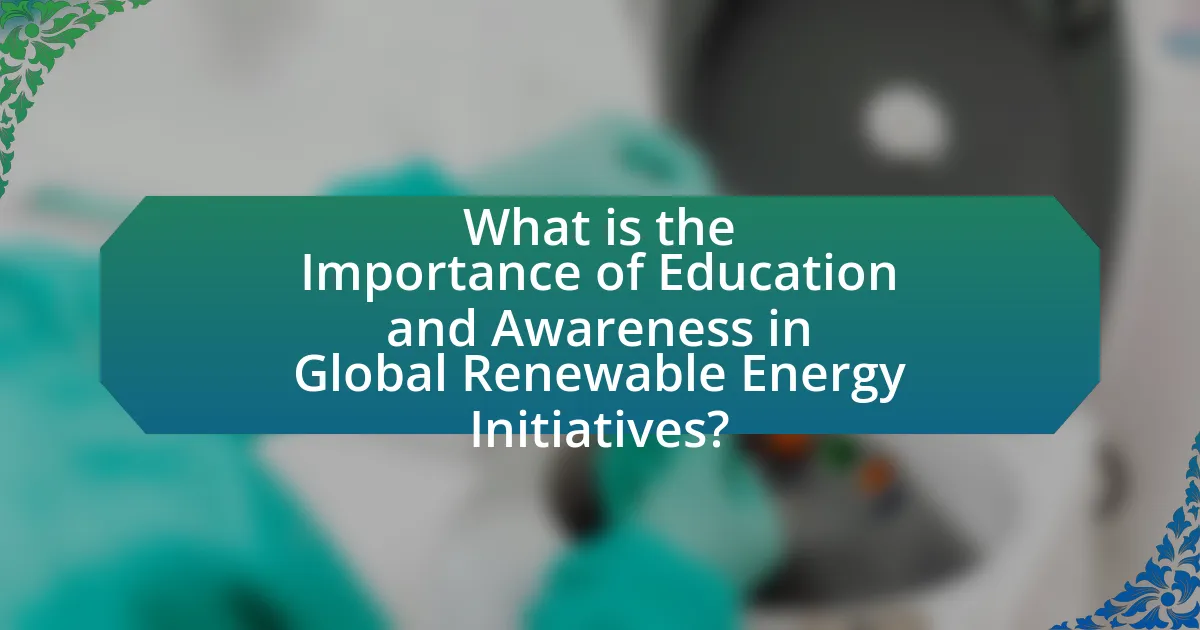
What is the Importance of Education and Awareness in Global Renewable Energy Initiatives?
Education and awareness are crucial in global renewable energy initiatives as they empower individuals and communities to understand the benefits and necessity of transitioning to sustainable energy sources. By fostering knowledge about renewable technologies, such as solar and wind energy, education enables informed decision-making and encourages the adoption of these alternatives. For instance, a study by the International Renewable Energy Agency (IRENA) highlights that increased public awareness can lead to a 20% rise in the acceptance of renewable energy projects. Furthermore, education promotes innovation and skill development, essential for creating a workforce capable of supporting the renewable energy sector. Thus, education and awareness serve as foundational elements in driving the global shift towards sustainable energy solutions.
Why is education crucial for renewable energy initiatives?
Education is crucial for renewable energy initiatives because it equips individuals and communities with the knowledge and skills necessary to understand, implement, and advocate for sustainable energy solutions. By fostering awareness of renewable technologies and their benefits, education drives public support and policy changes that facilitate the transition to cleaner energy sources. For instance, a study by the International Renewable Energy Agency (IRENA) highlights that countries with strong educational frameworks in renewable energy see higher rates of adoption and innovation in sustainable practices, demonstrating the direct correlation between education and effective renewable energy initiatives.
How does education influence public perception of renewable energy?
Education significantly influences public perception of renewable energy by enhancing understanding and awareness of its benefits and challenges. When individuals receive education on renewable energy, they are more likely to recognize its importance in addressing climate change, reducing dependence on fossil fuels, and promoting sustainable development. Research indicates that higher levels of education correlate with increased support for renewable energy policies; for instance, a study published in the journal “Energy Policy” found that individuals with a college education are more likely to advocate for renewable energy initiatives compared to those with lower educational attainment. This correlation suggests that education plays a crucial role in shaping informed opinions and fostering positive attitudes towards renewable energy solutions.
What role does education play in policy-making for renewable energy?
Education plays a crucial role in policy-making for renewable energy by equipping policymakers with the knowledge necessary to make informed decisions. It fosters understanding of renewable technologies, environmental impacts, and economic implications, which are essential for developing effective policies. For instance, studies show that countries with higher levels of education in energy-related fields tend to implement more progressive renewable energy policies. A report by the International Renewable Energy Agency (IRENA) highlights that education and training programs can significantly enhance the capacity of decision-makers to evaluate and adopt renewable energy solutions, thereby accelerating the transition to sustainable energy systems.
How does awareness impact the adoption of renewable energy technologies?
Awareness significantly enhances the adoption of renewable energy technologies by informing individuals and communities about the benefits and availability of these solutions. Increased awareness leads to greater public understanding of environmental issues, economic advantages, and the long-term sustainability associated with renewable energy sources. For instance, a study by the International Renewable Energy Agency (IRENA) found that countries with higher levels of public awareness and education regarding renewable energy saw a 30% increase in adoption rates compared to those with lower awareness levels. This correlation demonstrates that informed citizens are more likely to support policies and initiatives that promote renewable energy, ultimately driving its integration into the energy market.
What are the effects of awareness campaigns on renewable energy usage?
Awareness campaigns significantly increase renewable energy usage by educating the public about its benefits and availability. Research indicates that informed consumers are more likely to adopt renewable energy solutions, as evidenced by a study published in the journal “Energy Policy,” which found that communities exposed to awareness campaigns saw a 20% increase in solar panel installations. Additionally, these campaigns often lead to behavioral changes, encouraging individuals and businesses to prioritize sustainable energy sources, thereby contributing to a measurable rise in renewable energy adoption rates.
How can awareness lead to behavioral changes in energy consumption?
Awareness can lead to behavioral changes in energy consumption by informing individuals about the environmental impacts and costs associated with their energy use. When people understand how their actions contribute to energy waste and climate change, they are more likely to adopt energy-saving practices. For instance, studies show that households that receive information on energy consumption patterns reduce their energy use by an average of 10-15%. This reduction is often attributed to increased mindfulness regarding energy usage, such as turning off lights and using energy-efficient appliances. Therefore, awareness acts as a catalyst for individuals to modify their behaviors towards more sustainable energy consumption.
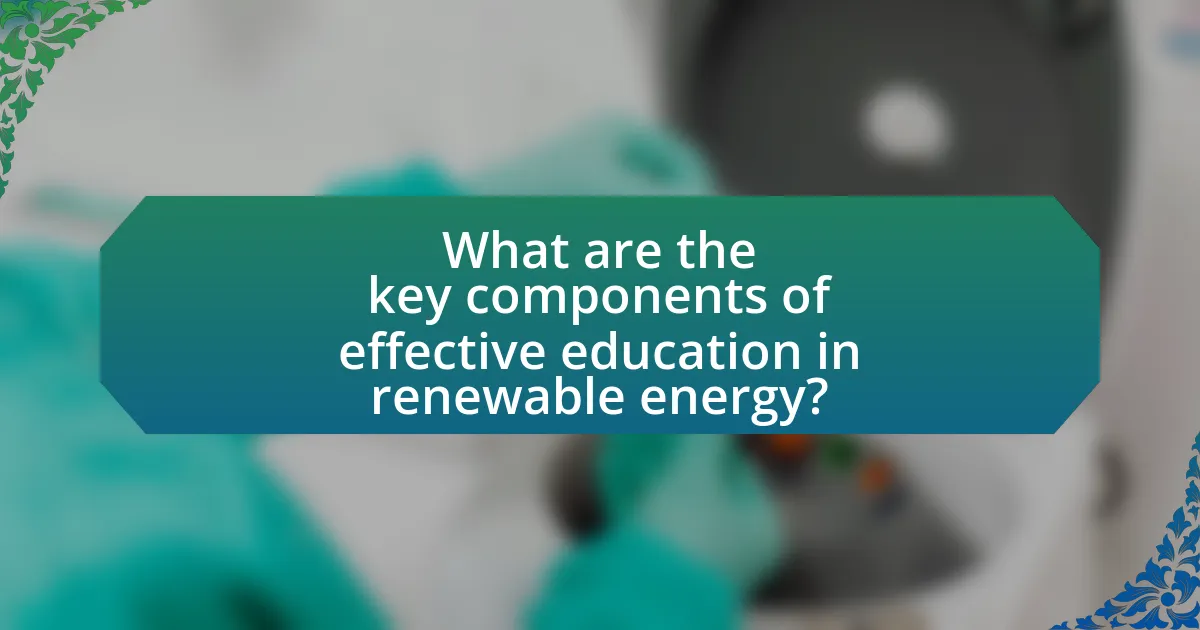
What are the key components of effective education in renewable energy?
The key components of effective education in renewable energy include comprehensive curriculum development, hands-on training, and community engagement. Comprehensive curriculum development ensures that educational programs cover essential topics such as solar, wind, and bioenergy technologies, as well as sustainability principles. Hands-on training provides students with practical experience, which is crucial for understanding the application of renewable energy technologies. Community engagement fosters awareness and encourages local participation in renewable energy initiatives, enhancing the overall impact of educational efforts. Research indicates that programs incorporating these components lead to higher retention rates and better preparedness for careers in the renewable energy sector.
What types of educational programs are most effective for renewable energy?
Hands-on training programs and interdisciplinary academic courses are the most effective educational programs for renewable energy. These programs provide practical experience and a comprehensive understanding of renewable technologies, policies, and environmental impacts. For instance, programs that incorporate laboratory work, field studies, and internships enable students to apply theoretical knowledge in real-world settings, enhancing their skills and employability. Research by the International Renewable Energy Agency indicates that countries with robust vocational training in renewable energy see a 20% increase in job placements in the sector, demonstrating the effectiveness of such educational approaches.
How do formal education systems incorporate renewable energy topics?
Formal education systems incorporate renewable energy topics through curriculum integration, specialized programs, and partnerships with industry. Many educational institutions include renewable energy concepts in science, technology, engineering, and mathematics (STEM) curricula, ensuring students learn about solar, wind, and other renewable sources. For instance, the National Renewable Energy Laboratory (NREL) collaborates with schools to develop educational resources that align with state standards, promoting awareness and understanding of renewable energy technologies. Additionally, universities often offer degree programs focused on renewable energy engineering and sustainability, preparing students for careers in this growing field.
What role do community workshops and seminars play in education?
Community workshops and seminars play a crucial role in education by facilitating knowledge sharing and skill development among participants. These interactive sessions provide a platform for individuals to engage with experts, learn about renewable energy initiatives, and discuss practical applications in their communities. Research indicates that such workshops enhance understanding and awareness, leading to increased community involvement in sustainable practices. For instance, a study by the International Renewable Energy Agency found that community engagement through workshops significantly boosts local participation in renewable energy projects, thereby fostering a culture of sustainability and informed decision-making.
How can technology enhance education and awareness in renewable energy?
Technology can enhance education and awareness in renewable energy by providing interactive learning platforms and real-time data access. For instance, online courses and simulations allow learners to engage with complex concepts in a user-friendly manner, while apps and websites can deliver up-to-date information on renewable energy developments. According to a report by the International Renewable Energy Agency (IRENA), digital tools can increase public engagement and understanding of renewable energy by 30%, demonstrating their effectiveness in promoting awareness and education.
What digital tools are available for educating about renewable energy?
Digital tools available for educating about renewable energy include interactive online platforms, mobile applications, virtual reality simulations, and educational websites. These tools facilitate engagement and understanding of renewable energy concepts. For instance, platforms like Khan Academy offer courses on renewable energy, while apps such as EnergyHub allow users to monitor energy consumption and learn about energy efficiency. Virtual reality experiences, like those provided by Oculus, immerse users in renewable energy environments, enhancing learning through simulation. Educational websites, such as the U.S. Department of Energy’s Energy.gov, provide comprehensive resources and information on renewable energy technologies and policies.
How can social media be leveraged for awareness campaigns?
Social media can be leveraged for awareness campaigns by utilizing its vast reach and engagement capabilities to disseminate information quickly and effectively. Platforms like Facebook, Twitter, and Instagram allow organizations to share educational content, infographics, and videos that highlight the importance of renewable energy initiatives. For instance, a study by the Pew Research Center found that 69% of adults in the U.S. use social media, making it an ideal channel for targeting diverse demographics. Additionally, social media enables real-time interaction, allowing organizations to engage with their audience through comments, shares, and live discussions, which can enhance community involvement and foster a sense of urgency around renewable energy issues.
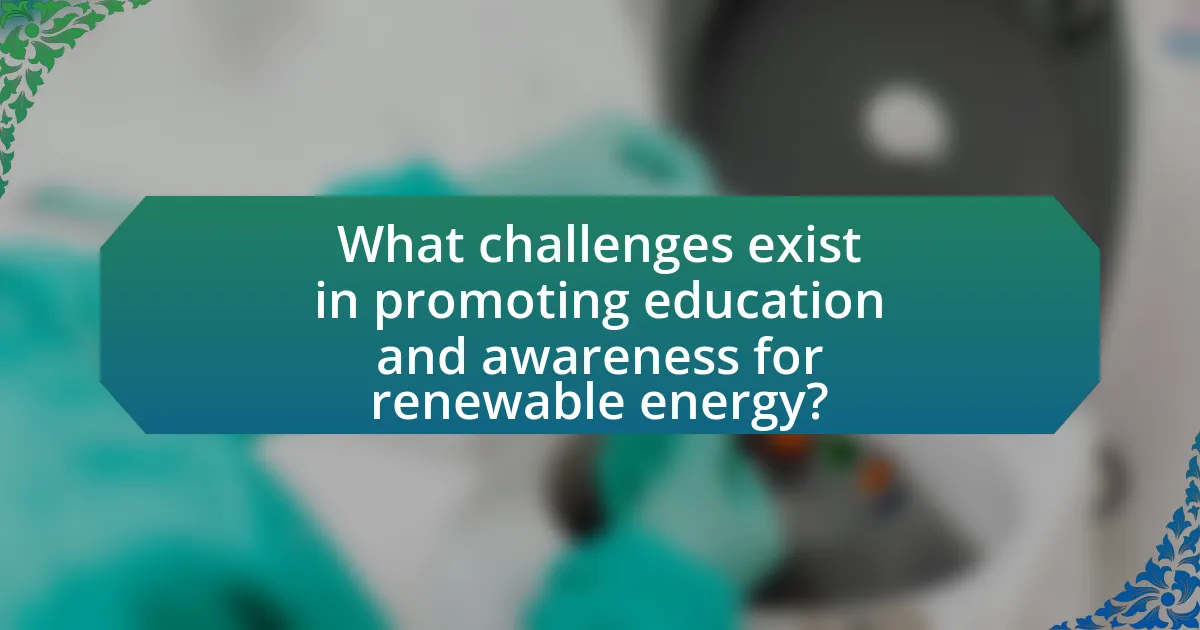
What challenges exist in promoting education and awareness for renewable energy?
Promoting education and awareness for renewable energy faces several challenges, including misinformation, lack of funding, and insufficient integration into existing curricula. Misinformation about renewable energy technologies can lead to public skepticism and resistance, undermining educational efforts. Additionally, limited financial resources often restrict the development and dissemination of educational materials and programs. Furthermore, the absence of comprehensive renewable energy topics in school curricula hinders early exposure and understanding among students, which is crucial for fostering a knowledgeable future workforce. These challenges collectively impede the effective promotion of renewable energy education and awareness.
What barriers do educators face in teaching renewable energy concepts?
Educators face several barriers in teaching renewable energy concepts, including a lack of resources, insufficient training, and limited curriculum integration. The scarcity of up-to-date teaching materials and technology hinders effective instruction, as many educators do not have access to the latest information or tools necessary for teaching these concepts. Additionally, many teachers report feeling unprepared to teach renewable energy topics due to inadequate professional development opportunities, which can lead to a lack of confidence in delivering the content. Furthermore, renewable energy education is often not integrated into existing curricula, making it challenging for educators to find ways to incorporate these essential topics into their lessons. These barriers collectively impede the effective teaching of renewable energy concepts, which is crucial for fostering awareness and understanding in students.
How does funding affect renewable energy education initiatives?
Funding significantly enhances renewable energy education initiatives by providing essential resources for curriculum development, training programs, and outreach activities. Increased financial support allows educational institutions to develop comprehensive programs that cover the latest technologies and practices in renewable energy. For instance, a study by the International Renewable Energy Agency (IRENA) found that countries investing in renewable energy education saw a 30% increase in student enrollment in related fields, demonstrating a direct correlation between funding levels and educational engagement. Additionally, funding enables partnerships with industry leaders, facilitating internships and hands-on experiences that further enrich the learning process.
What misconceptions about renewable energy hinder education efforts?
Misconceptions about renewable energy that hinder education efforts include the belief that renewable sources are unreliable and insufficient to meet energy demands. This perception is often fueled by outdated information and a lack of understanding of advancements in technology. For instance, studies show that renewable energy sources like solar and wind have become increasingly reliable, with the International Renewable Energy Agency reporting that renewables accounted for 29% of global electricity generation in 2020, demonstrating their capability to meet substantial energy needs. Additionally, the misconception that renewable energy is too expensive has been debunked; the cost of solar and wind energy has decreased significantly, making them competitive with fossil fuels. These misconceptions create barriers to effective education and awareness, as they perpetuate skepticism and resistance to adopting renewable technologies.
How can collaboration improve education and awareness in renewable energy?
Collaboration can significantly enhance education and awareness in renewable energy by pooling resources, expertise, and diverse perspectives. When educational institutions, government agencies, and private organizations work together, they can create comprehensive programs that address various aspects of renewable energy, such as technology, policy, and environmental impact. For instance, partnerships between universities and energy companies can lead to innovative research projects and internships that provide students with hands-on experience, thereby increasing their understanding and engagement with renewable energy solutions. Additionally, collaborative initiatives can facilitate the sharing of best practices and successful case studies, which can be disseminated through workshops, seminars, and online platforms, reaching a broader audience. This collective effort not only raises awareness but also fosters a culture of sustainability and innovation, essential for advancing global renewable energy initiatives.
What partnerships are essential for effective renewable energy education?
Effective renewable energy education relies on partnerships between educational institutions, government agencies, non-profit organizations, and the private sector. Educational institutions provide the foundational knowledge and research necessary for understanding renewable energy technologies. Government agencies can facilitate policy support and funding for educational programs, while non-profit organizations often engage communities and promote awareness. The private sector contributes by offering practical insights, resources, and real-world applications of renewable energy solutions. For instance, collaborations between universities and energy companies have led to innovative curriculum development and hands-on training programs, enhancing the educational experience and preparing students for careers in the renewable energy field.
How can governments and NGOs work together to promote awareness?
Governments and NGOs can collaborate effectively to promote awareness by creating joint educational campaigns that leverage each other’s strengths. For instance, governments can provide funding and regulatory support, while NGOs can offer grassroots outreach and expertise in community engagement. A successful example is the partnership between the United Nations Development Programme (UNDP) and various NGOs, which has led to increased public awareness about renewable energy through initiatives like the Global Environment Facility. This collaboration has resulted in measurable increases in community participation and understanding of renewable energy benefits, demonstrating the effectiveness of combined efforts in raising awareness.
What best practices can enhance education and awareness in renewable energy?
Best practices that can enhance education and awareness in renewable energy include integrating renewable energy topics into school curricula, promoting community workshops, and utilizing digital platforms for outreach. Integrating renewable energy into educational systems ensures that students receive foundational knowledge early, fostering a generation that values sustainability. Community workshops provide hands-on experiences, allowing participants to engage with renewable technologies directly, which can increase understanding and interest. Utilizing digital platforms, such as social media and online courses, expands reach and accessibility, enabling a broader audience to learn about renewable energy solutions. According to a report by the International Renewable Energy Agency, education and training in renewable energy can significantly increase public awareness and acceptance, leading to greater adoption of sustainable practices.
How can interactive learning methods improve understanding of renewable energy?
Interactive learning methods enhance understanding of renewable energy by engaging learners through hands-on experiences and collaborative activities. These methods, such as simulations, group projects, and interactive workshops, allow participants to apply theoretical knowledge in practical scenarios, which reinforces learning. Research indicates that active participation in learning environments significantly improves retention rates; for instance, a study published in the Journal of Renewable Energy Education found that students who engaged in interactive learning scored 30% higher on assessments related to renewable energy concepts compared to those who learned through traditional lectures. This evidence supports the effectiveness of interactive learning in fostering a deeper comprehension of renewable energy topics.
What role do case studies play in effective renewable energy education?
Case studies play a crucial role in effective renewable energy education by providing real-world examples that illustrate the practical applications and impacts of renewable technologies. They enable learners to analyze specific projects, understand challenges faced, and evaluate solutions implemented in various contexts, thereby enhancing critical thinking and problem-solving skills. For instance, a case study on Denmark’s wind energy initiatives demonstrates how policy frameworks and community engagement can lead to significant advancements in renewable energy adoption, showcasing a 47% share of wind power in the country’s electricity consumption as of 2020. This concrete evidence reinforces the importance of case studies in bridging theoretical knowledge with practical insights, making them an essential tool in renewable energy education.
What practical steps can individuals take to promote renewable energy awareness?
Individuals can promote renewable energy awareness by engaging in community education initiatives. This can include organizing workshops, seminars, or informational sessions that focus on the benefits and importance of renewable energy sources such as solar, wind, and hydroelectric power. Research indicates that community-based education significantly increases public knowledge and acceptance of renewable technologies, as seen in studies conducted by the National Renewable Energy Laboratory, which found that informed communities are more likely to support renewable energy projects. Additionally, individuals can utilize social media platforms to share informative content, advocate for policy changes, and connect with local environmental organizations to amplify their message.
